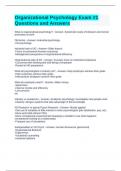-
1. Examen - Business and industrial psychology exam questions with latest update
-
2. Examen - Historical background of industrial psychology exam questions with latest update
-
3. Examen - Industrial & organizational psychology - final exam study guide questions and answers
-
4. Examen - Industrial and organizational psychology chapter 6 second exam questions and answers
-
5. Examen - Industrial organization psychology chapters 1-5 exam questions with latest update
-
6. Examen - Industrial organization psychology ch's 1-3 exam questions with verified answers
-
7. Examen - Industrial organization psychology exam 2 questions with latest update
-
8. Examen - Industrial organization psychology final exam questions and answers
-
9. Examen - Industrial organizational psychology - exam 1 (multiple choice practices) questions w...
-
10. Examen - Industrial organizational psychology exam 1 (ch. 1-5) questions with complete solutio...
-
11. Examen - Industrial organizational psychology exam 1 questions and answers latest update
-
12. Examen - Industrial organizational psychology exam 1 questions and answers
-
13. Examen - Industrial organizational psychology exam 1 questions with verified answers
-
14. Examen - Industrial organizational psychology exam 2 review questions with correct answers
-
15. Examen - Industrial organizational psychology exam questions with complete solutions
-
16. Examen - Industrial organizational psychology exam questions with correct answers
-
17. Examen - Industrial organizational psychology exam questions with latest update
-
18. Examen - Industrial organizational psychology exam study terms chapters 1-2 questions and answ...
-
19. Examen - Industrial organizational psychology final exam questions and answers latest update
-
20. Examen - Industrial organizational psychology final exam questions with correct answers
-
21. Examen - Industrial organizational psychology midterm exam questions with correct answers
-
22. Examen - Industrial organizational psychology test 1 exam questions with complete solutions
-
23. Examen - Industrial organizations psych exam 1 (chapters 1, 2, and 4) questions and answers
-
24. Examen - Industrial psych exam 1 questions with correct answers
-
25. Examen - Industrial psych exam one (ch. 1-6) questions with correct answers
-
26. Examen - Industrial psychology - final exam questions and answers
-
27. Examen - Industrial psychology - p323 final exam review questions and answers
-
28. Examen - Industrial psychology (exam 1 questions with correct answers latest update
-
29. Examen - Industrial psychology 2024 board exam questions and answers
-
30. Examen - Industrial psychology ch 8, 9, 10 exam questions with correct answers
-
31. Examen - Industrial psychology exam 1 (chapters 1-3) question s and answers
-
32. Examen - Psychology 336 (industrial psychology) exam 1 questions and answers
-
33. Examen - Psych ch. 15 industrial and organizational psychology exam questions and answers
-
34. Examen - Psyc 142 industrial organizational psych exam 1 questions with latest update
-
35. Examen - Personnel and industrial psychology exam 1 questions with verified answers
-
36. Examen - Organizational psychology exam #1 questions and answers
-
37. Examen - Module 1. introduction to industrial and organizational psychology exam questions and...
-
38. Examen - I/o psychology exam 1 questions with correct answers
-
39. Examen - I-o psychology exam 1 ch.1-5 questions with verified answers
-
40. Examen - Introduction to industrial-organizational psychology exam questions and answers
-
41. Examen - Intro to industrial organizational psychology final exam questions with correct answe...
-
42. Examen - Industrial-organizational psychology midterm exam questions with latest update
-
43. Examen - Industrial-organizational psychology human factors exam questions and answers
-
44. Examen - Industrial-organizational psychology exam 3 questions with complete solutions
-
45. Examen - Industrial-organizational psychology exam 2 questions with verified answers
-
46. Examen - Industrial-o psychology exam 1 (ch. 1-4) questions with correct answers 2024
-
47. Examen - Industrial psychology-exam 1 questions and answers
-
48. Examen - Industrial psychology unit 1 exam questions with correct answers
-
49. Examen - Industrial psychology recruitment and selection exam questions with latest update
-
50. Examen - Industrial psychology final study guide exam questions with latest update
-
51. Examen - Industrial psychology exam test guide questions and answers
-
52. Examen - Industrial psychology exam questions and answers
-
53. Examen - Industrial psychology exam 3 questions and answers
-
54. Examen - Industrial psychology exam 3 questions and answers
-
55. Examen - Industrial psychology exam 3 questions and answers
-
56. Examen - Industrial psychology exam 2 questions with correct answers
-
57. Examen - Industrial psychology exam 2 questions and answers
-
58. Examen - Industrial psychology exam 1 material questions with correct answers
-
Montrer plus




